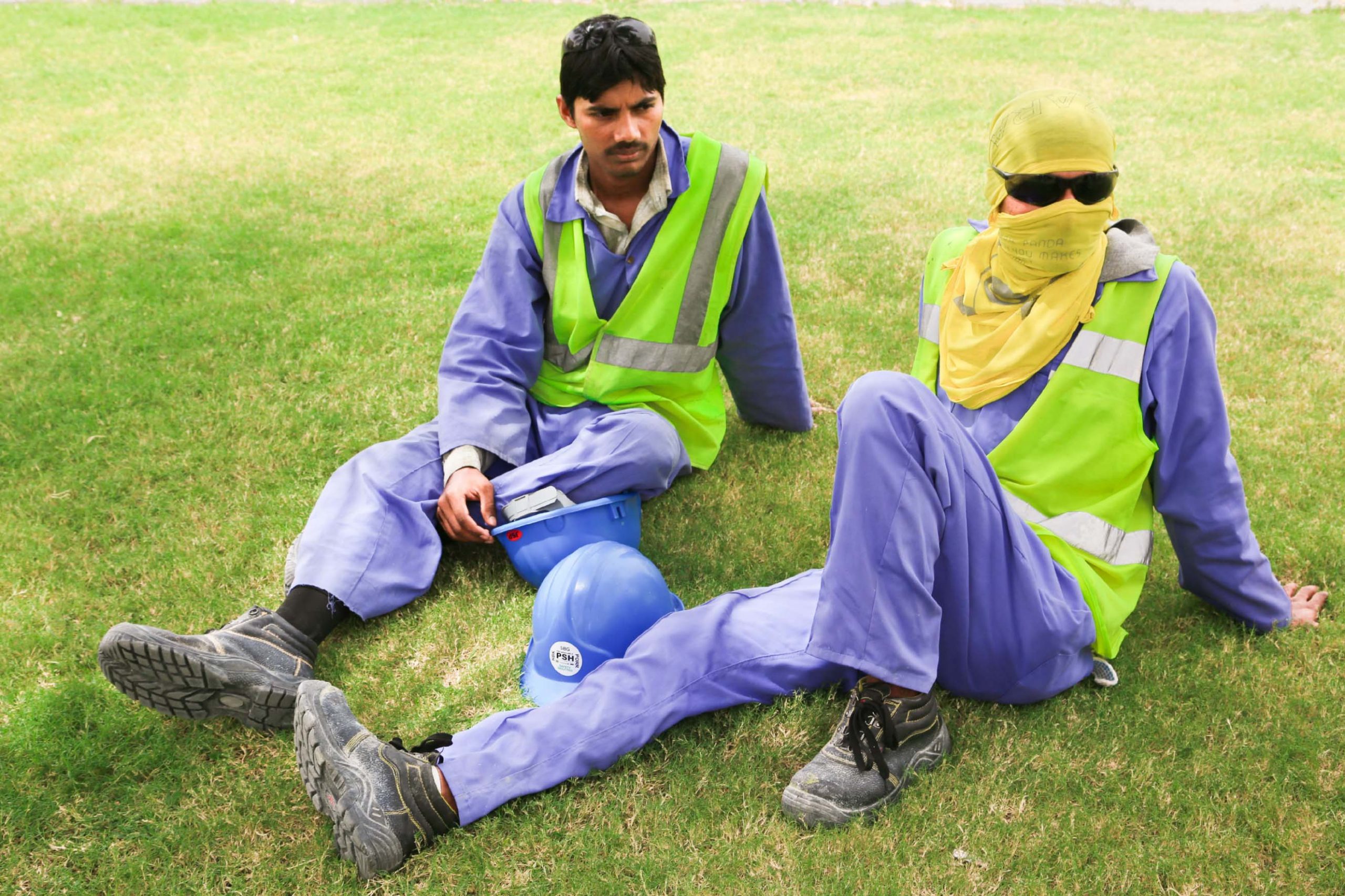
Despite pledges to improve its labor conditions, Qatar has made minimal progress over the past year in tackling the widespread abuse of migrant workers by their sponsors, an Amnesty International researcher has said.
Representatives of the human rights advocacy organization returned to Qatar earlier this month to assess the labor landscape a year and a half after releasing a comprehensive report titled The Dark Side of Migration.
That 2013 investigation was based on interviews with 200 male construction workers and more than a dozen conversations with government officials.

It documented cases of unpaid wages, employers failing to renew their workers’ residency permits, unsanitary living conditions and other forms of mistreatment.
At the time, Amnesty called on Qatar to abolish the country sponsorship (kafala) and scrap rules that require expats to obtain their employer’s permission to change jobs or leave the country, among other recommendations.
Representatives of Amnesty, which has warned Qatar that it is running out of time to introduce meaningful reforms ahead of the 2022 World Cup, said they were not heartened by their latest visit to the country.
“It’s already very clear that very little has changed,” Amnesty researcher Mustafa Qadri told Doha News.
“We interviewed hundreds of workers who haven’t been paid for months and don’t have valid IDs. It’s not their fault. It’s the fault of their employers,” he added.
Detention center visit
Qadri’s two-week trip to Qatar included a visit to a local deportation center where expats arrested by the Ministry of Interior’s (MOI) Search and Follow-up Department are held.

He said he met a Nigerian engineer who told Qadri that he had paid the equivalent of several thousand dollars to a recruiter in order to come to Qatar. However, he said there was no job waiting for him when he arrived and that his sponsor failed to obtain a residency permit for him.
The man said he found another employer who was interested in hiring him, but his original sponsor refused to grant him a no-objection certificate and reported him to authorities, who arrested him.
“There are people who just want to work (and) be paid the money (they) were promised,” Qadri said.
The Qatar Tribune, citing Qatar’s state news agency, reported on Qadri’s visit to the detention center in a front-page article today titled, “Amnesty hails MOI’s human rights record.”
Qadri took issue with how his visit was portrayed:
Qatar Tribune fabricated quote of me. Shameful propaganda not journalism, who are you fooling? Certainly not 1000s workers abused each day
— Mustafa Qadri (@Mustafa_Qadri) March 15, 2015
Over a dozen migrants stuck in deportation centre all spoke of trauma, lost earnings and other abuse due to Kafala and other failings #Qatar
— Mustafa Qadri (@Mustafa_Qadri) March 15, 2015
However, the report did note that Qatar is working to help some of those who have been detained unfairly. An MOI brigadier said his department had purchased plane tickets for more than 5,000 expats to be sent home, but did not say in what time period.
Status quo
Qadri said many abuses of workers in Qatar continue to be perpetrated by recruitment and manpower firms, which he argued lack adequate oversight.
Amnesty has previously noted that the lax enforcement of existing policies for recruiting and employing migrant workers enable the “widespread” abuse of construction workers by both Qatari and foreign business owners.

Some organizations – namely Qatar Foundation and the Supreme Committee for Delivery and Legacy, which is overseeing the construction of the country’s World Cup stadiums and training facilities – have attempted to address this issue through so-called workers’ charters.
These documents prescribe minimum living, working and recruitment standards for contractors working on the organizations’ projects. They include a ban on firms and their subcontractors using the services of recruiters who make workers pay fees, misinform them about the living and working conditions in Qatar or fail to provide an original offer of employment to expats.
Qadri said that while the efforts are welcome, many of the standards “should be expected.”
“You shouldn’t be praised for doing basic things.”
He added that the charters rolled out by QF and the Supreme Committee only apply to a fraction of Qatar’s construction-sector workforce and are no substitute for national standards.
However, FIFA President Sepp Blatter highlighted these standards as “progress” following a meeting with Qatar’s Emir today ahead of a FIFA executive committee meeting next week in Zurich.
“It is encouraging to hear the Emir’s personal commitment to workers’ welfare and to get a sense of the improvements planned for all workers in Qatar,” Blatter said in a statement.
“It is clear that Qatar takes its responsibility as host seriously and sees the FIFA World Cup as a catalyst for positive social change.”
Finally, Qadri noted that the government officials Amnesty recently met with gave no timeline for the implementation of Qatar’s long-awaited changes to the country’s sponsorship system.
Last May, officials proposed making it easier for expats to leave the country and change jobs, but have yet to officially make the changes – which human rights advocates argued fell short of what’s required to protect the rights of migrants.
“There’s no justification for the delay,” Qadri said.
“Unless urgent steps are taken, when people marvel at all the buildings and developments in 2022, (they’ll see structures) built on the backs of a lot of misery.”
Thoughts?







